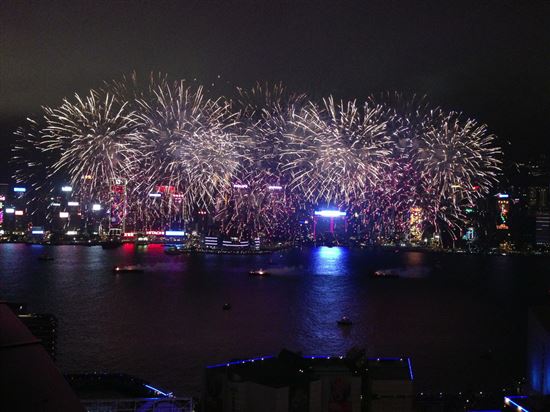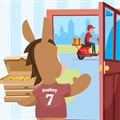23 Illuminating Chinese New Year Facts and Statistics
In 2015, the Chinese New Year is set to begin on February 19th, and what follows is a 15-day period of feasting, fireworks, and time with family and friends. If you want to have your own Chinese New Year festival at home or you're already a reveler who wants more information about this tradition, CreditDonkey has unearthed some eye-opening facts and statistics about this long-standing event.
 |
| © Karl Baron (CC BY 2.0) via Flickr |
1. The holiday has some interesting roots
Although you won't find it in the history books, legend has it that Chinese New Year began thanks to a mythical creature named Nian . In order to protect themselves from this livestock-devouring beast, villagers would hang red lanterns and set firecrackers to frighten it away. Such traditions still continue today.
2. China began observing traditional New Year fairly recently
Julius Caesar first decreed that January 1st should be the start of the New Year in 46 B.C., but it was quite a bit longer before the Chinese caught on. The general population didn't begin officially celebrating New Year's Day until 1912.
3. Chinese New Year was banned for part of the 20th century
In 1949, Communist Party Leader Mao Zedong ordered the Chinese people adhere strictly to the Gregorian calendar used by the rest of the world. The rule continued well into the 1990s, until officials relented and began once again encouraging public observance of the Spring Festival.
4. Fireworks have been banned from many celebrations
Beijing has one of the worst smog problems in the world, and the annual fireworks show that accompanies the Chinese New Year only makes things worse. This prompts calls for the light shows to not go on. Some cities implemented permanent bans, worried about the showers of sparks causing fires, injuries, and related deaths. In 2009, for example, fireworks for Chinese New Year were blamed for the death of a firefighter and $700 million in damages.
5. But fireworks have become a staple
Fireworks displays are a regular feature of Chinese New Year celebrations, and a staggering number of them light up the skies over the course of the festival. In 2013, the city of Hong Kong launched nearly 24,000 fireworks alone.
6. Celebrants take the event day by day, literally
A different tradition is observed each day, such as a temporary ban on cleaning, paying your respects to your in-laws, and praying for good fortune in the New Year. It's all capped off with the Lantern Festival, the highlight of which is the Dragon Dance.
7. The second day of the festival is sacred for dogs
The Chinese believe that the second day of the New Year celebration is also the birthday of all dogs, everywhere. On this day, residents are encouraged to give their furry friends a little extra love and special foods to mark the occasion.
8. But they're not the only animal associated
If you're familiar with astrology, you know that the month you were born in determines whether you're a Gemini, Capricorn, or Pisces. In China, the year of your birth corresponds to one of 12 animals , which include a horse, rat, snake, pig and rooster.
9. You won't want to leave home on the fifth day
Here’s an excuse for you to stay home from work, if you’re not able to trek out to China to join in the festivities. The fifth day is reserved for staying home to welcome the god of wealth, and spending time with family or friends is said to bring bad luck. Sorry, boss, that does not include you.
10. 2015 may bring bad luck for some
This year is heralded as the Year of the Sheep, and that's not necessarily good news if you believe in Chinese superstition. The Year of the Sheep is traditionally considered one of the least desirable birth years , thought to produce children who are meek or otherwise unable to survive in a harsh world.
11. Then again, it doesn't always mean misfortune
Lots of famous people born in the Year of the Sheep might argue that it hasn't brought them bad luck at all. Some of the most notable celebrities who were born under the sheep symbol include Bruce Willis , Nicole Kidman, and Steve Jobs.
12. Not everyone sends out cards for the occasion
Buying cards and postage can add up to a pretty decent expense, especially for those who have an extended family or a wide circle of friends. To get around the cost, Chinese residents often use their phones to send New Year's greetings instead. In 2013, more than 31 billion text messages and 130 picture or video messages were sent during the festival season.
13. Travel is nothing short of a nightmare
Yes, big celebrations are great for spending time with family, but they’re also synonymous with gridlock. Just as Americans clog the railways, roads and airports during their biggest holidays, the Chinese pack their bags in big numbers in the weeks leading up to and after the New Year celebrations. In 2014, an estimated 3.62 billion passengers traveled in some capacity to get to their destination in China.
14. Most of them are hitting the highways
By and large, the majority of travelers stick to cars, vans, and buses to complete their trips during the holiday period. Roughly 3 billion people chose the open road over planes, trains, and boats in 2013, and there were nearly 97 million vehicles jockeying for position in traffic. An estimated 42 million people preferred to fly instead to reach their destination. That comes out to about an additional 12,000 flights extra for each week of the festival.
15. The annual travel period lasts more than a month
Shuffling billions of people back and forth across a country as large as China certainly takes time. It's estimated that the annual migration of Chinese New Year revelers takes some 40 days to complete.
16. Accidents occur all too often
With so many vehicles clogging the roadways, it's a foregone conclusion that accidents will happen. While most of them aren't fatal, deaths do occur. More than 50 people lost their lives over one three-day period alone during the 2013 celebrations.
17. Cars aren't the only thing you can rent
While many travelers rent vans or buses to get them where they need to go during Chinese New Year, some are renting dates instead. One Chinese shopping website that advertises "rental boyfriends" for the holiday season reported an 884% increase in search traffic during the weeks leading up to the 2013 event.
18. Chinese New Year is great for businesses
As people flood larger cities like Beijing and Hong Kong, retailers are seeing their sales skyrocket. During the 2014 Spring Festival, retail stores pulled in 610.7 billion yuan , which translates to roughly $98 billion in U.S. dollars. The celebration spillover to other countries is good for their economies as well; many restaurants in London’s Chinatown transform their menus to attract as many patrons as possible.
19. Restaurants are also reaping the benefits
Delicious food is one of the centerpieces of Chinese New Year, and restaurants are ready to serve. In 2013, restaurant sales in Tianjin and Hubei increased by 18.5% and 15.5% respectively.
20. Luxury foods are losing favor
The dumpling is a staple of the Spring Festival. While high-end restaurants specialize in tastes that are a little more exotic, many attendees opt for more casual dining fare in China. Sales of premium foods like shark fin and abalone decreased by 70% and 40% respectively in 2013.
21. Alcohol sales have also taken a dive
Efforts by the Chinese government to deter corruption have led to a decline in the sales of other luxury items as well. In Fuzhou alone, alcohol sales saw a 70% drop during the 2014 festival.
22. Flower displays are prominent
Gifting flowers or potted plants is a Chinese New Year tradition, and there are plenty of blooms on view during the festival. The Yuntai Garden in Guangzhou boasts 300,000 tulips alone.
23. Celebrating Chinese New Year is a global event
London, England, and Sydney, Australia, both claim they have the largest Chinese New Year celebrations outside of the Asian country and that their share of dragon boat races, parades, and Chinese cuisine can actually “rival” those of China. We’re not going to weigh in on that debate, but we do have ideas on how you can bring the celebration to your own home if you don’t live in China or don’t have a Chinatown near you. Definitely make a point of incorporating your family into the celebrations, consider watching one of the parades online, try making authentic dishes, and see if you can get a neighborhood group together to light some paper lanterns.
Sources and References:
Rebecca Lake is a journalist at CreditDonkey, a credit card comparison and reviews website. Write to Rebecca Lake at rebecca@creditdonkey.com. Follow us on Twitter and Facebook for our latest posts.
Note: This website is made possible through financial relationships with some of the products and services mentioned on this site. We may receive compensation if you shop through links in our content. You do not have to use our links, but you help support CreditDonkey if you do.
Read Next:
